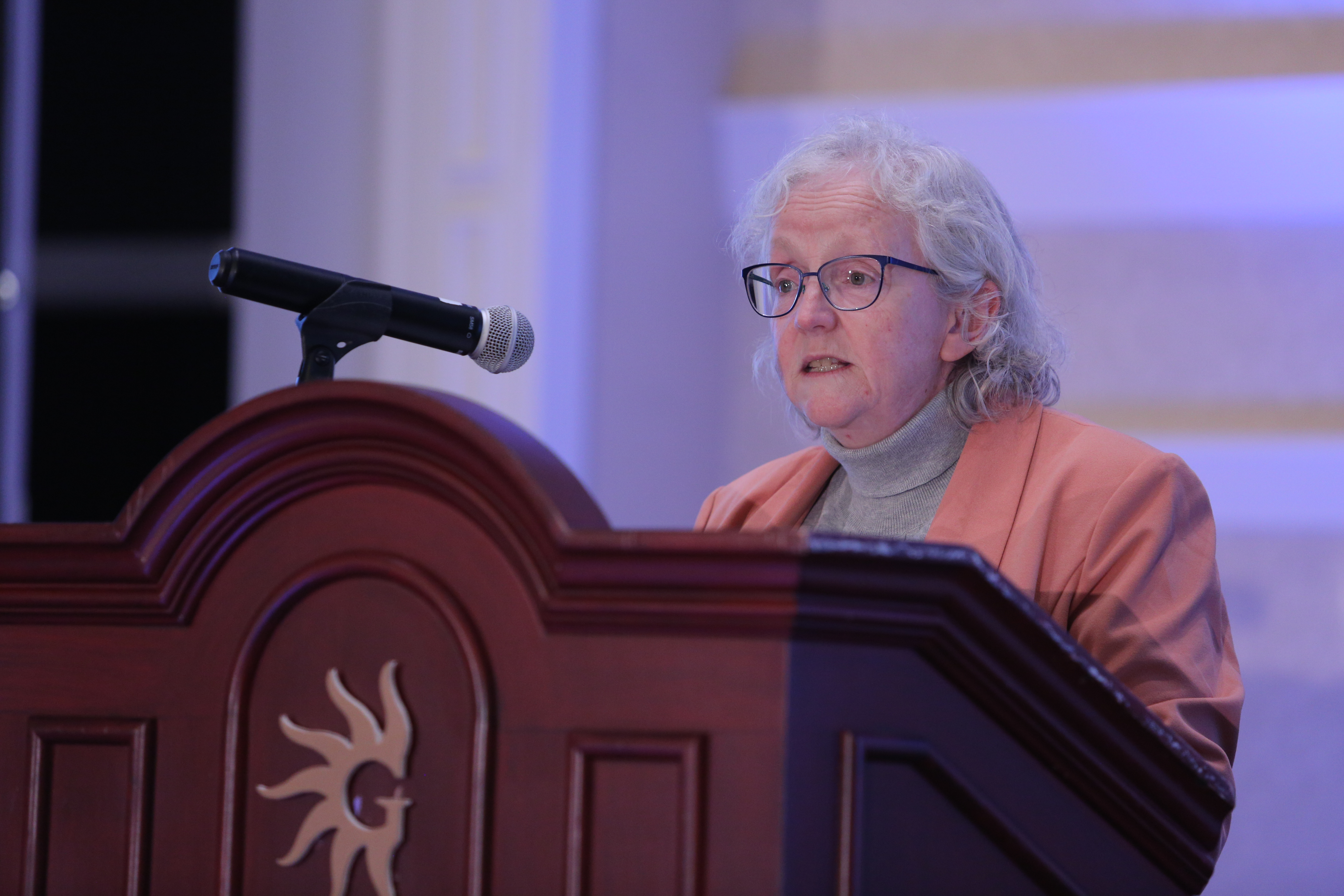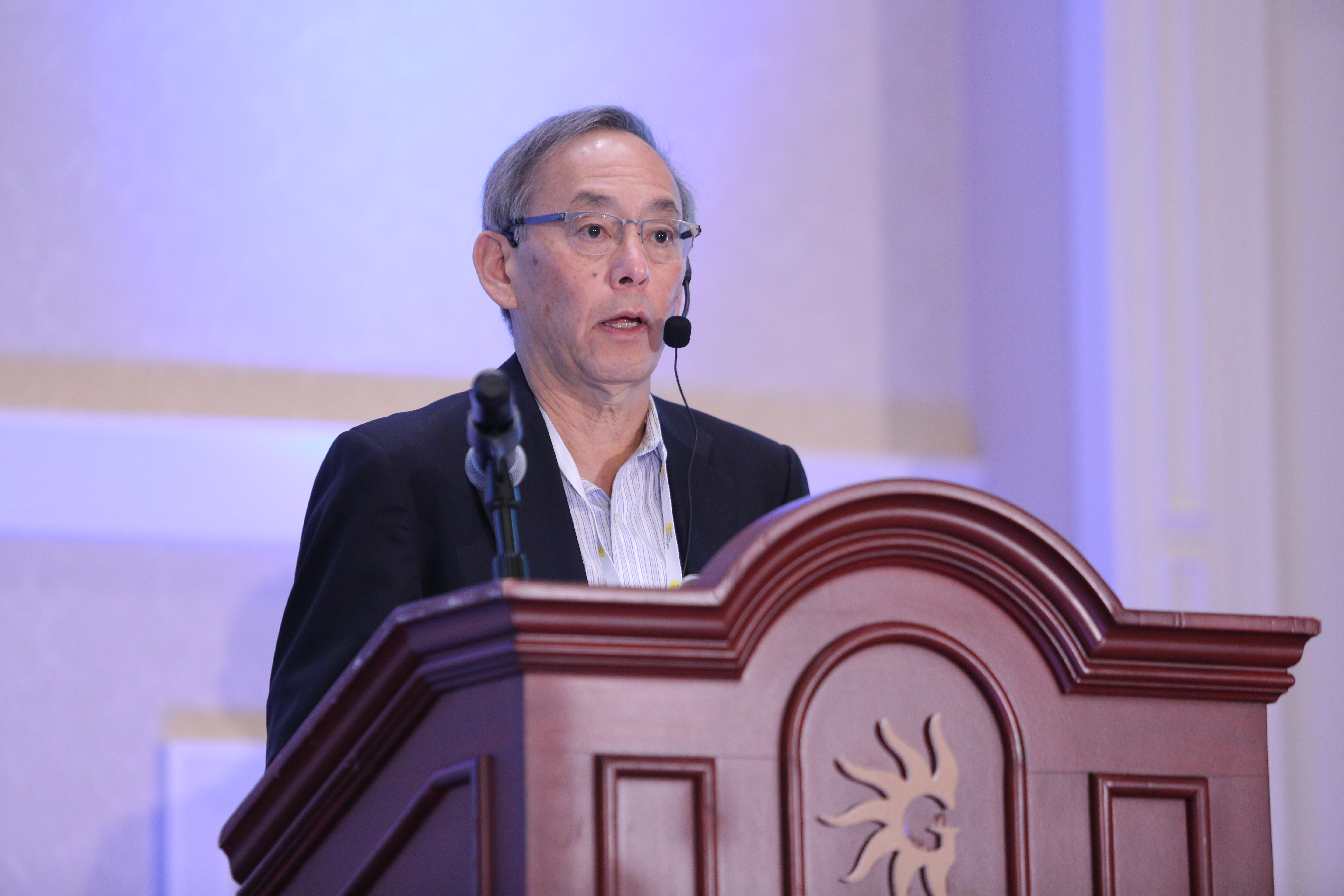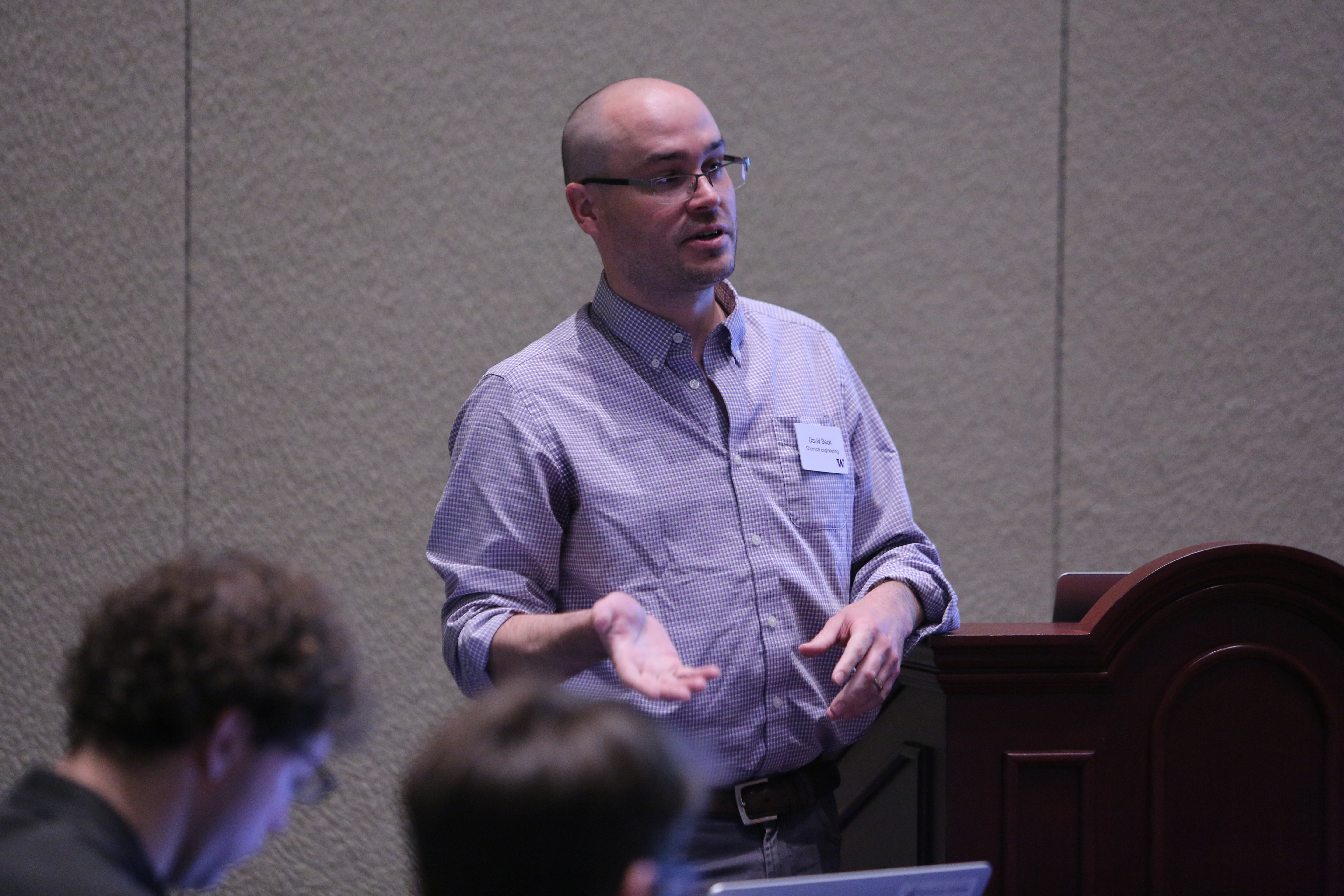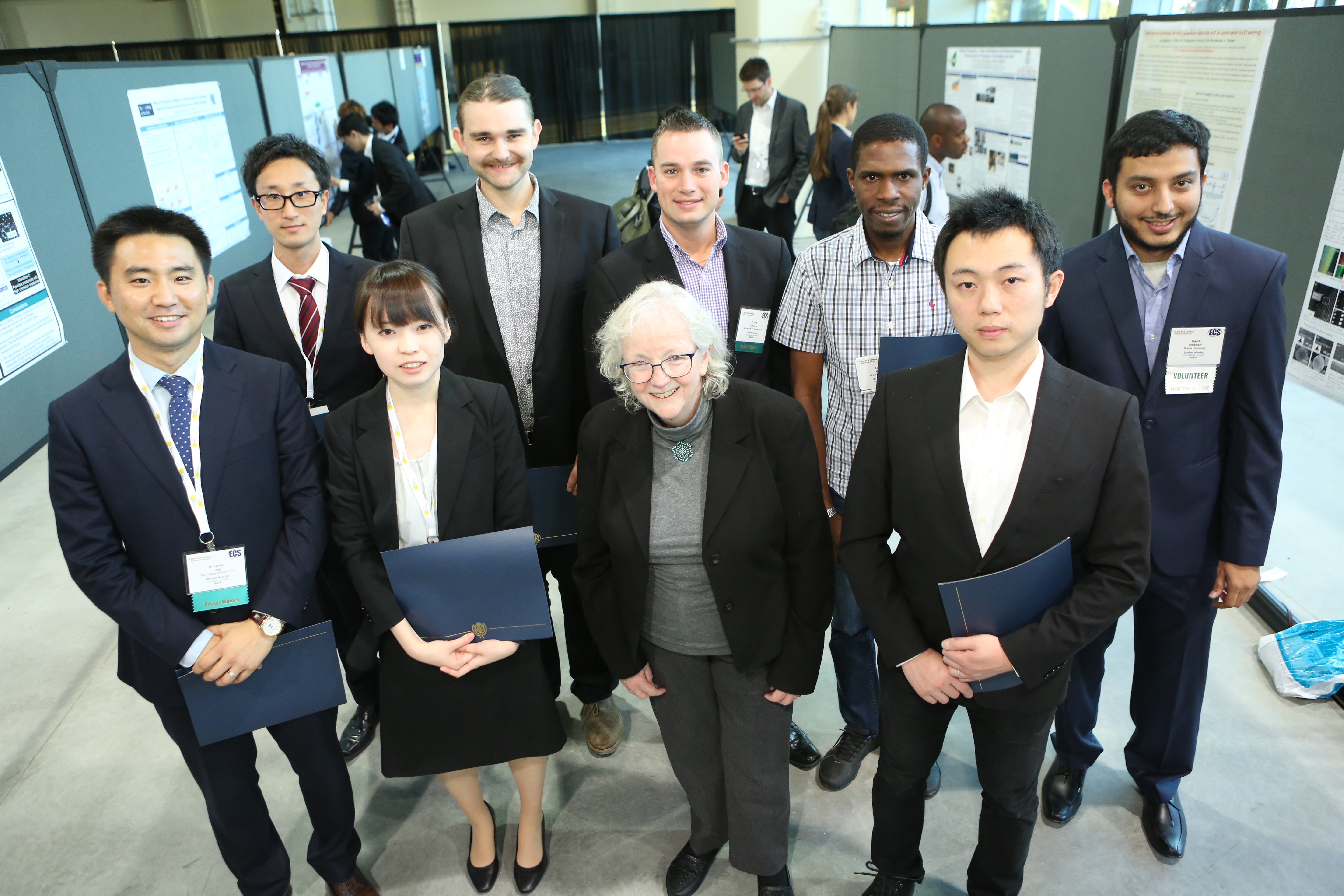Nearly 2,400 people from 54 countries attended the 232nd ECS Meeting in National Harbor, Maryland, October 1-5, 2017. Participants could choose from 49 symposia, over 1,250 oral talks, 644 student presentations, and nearly 570 posters.
Plenary Session
ECS President Johna Leddy welcomed attendees to the meeting during Monday evening’s plenary session. In addition to wrapping up the first full day of technical sessions and honoring award winners, Leddy highlighted the 115th anniversary of the establishment of ECS and the Society’s bold move toward complete open access through the Free the Science initiative.
“Three years ago ECS committed to the vision of Free the Science, an initiative to sustain ECS publications into the future of scholarly communications,” Leddy said. “ECS is one of the only scientific communities to take such a bold stance, recognizing the problems that exist in the current structure of scholarly publishing. Much like our founders 115 years ago, we are taking the lead and carving out a unique position.”
The ECS Lecture
Former U.S. Secretary of Energy and Nobel Laureate, Steven Chu, delivered this year’s ECS Lecture, “The Role of Electrochemistry in our Transition to Sustainable Energy.”
Chu’s talk focused on the importance of electrochemistry in the coming decades as the energy landscape continues to evolve.
“We want to take cheap, clean energy, turn it into a chemical fuel, stick it in a tank, and then ship it. At that point, paired with the capture of CO2, we can being to really phase out fossil fuels,” Chu said during his talk. “I see electrochemistry at the heart of all of this.”
OpenCon
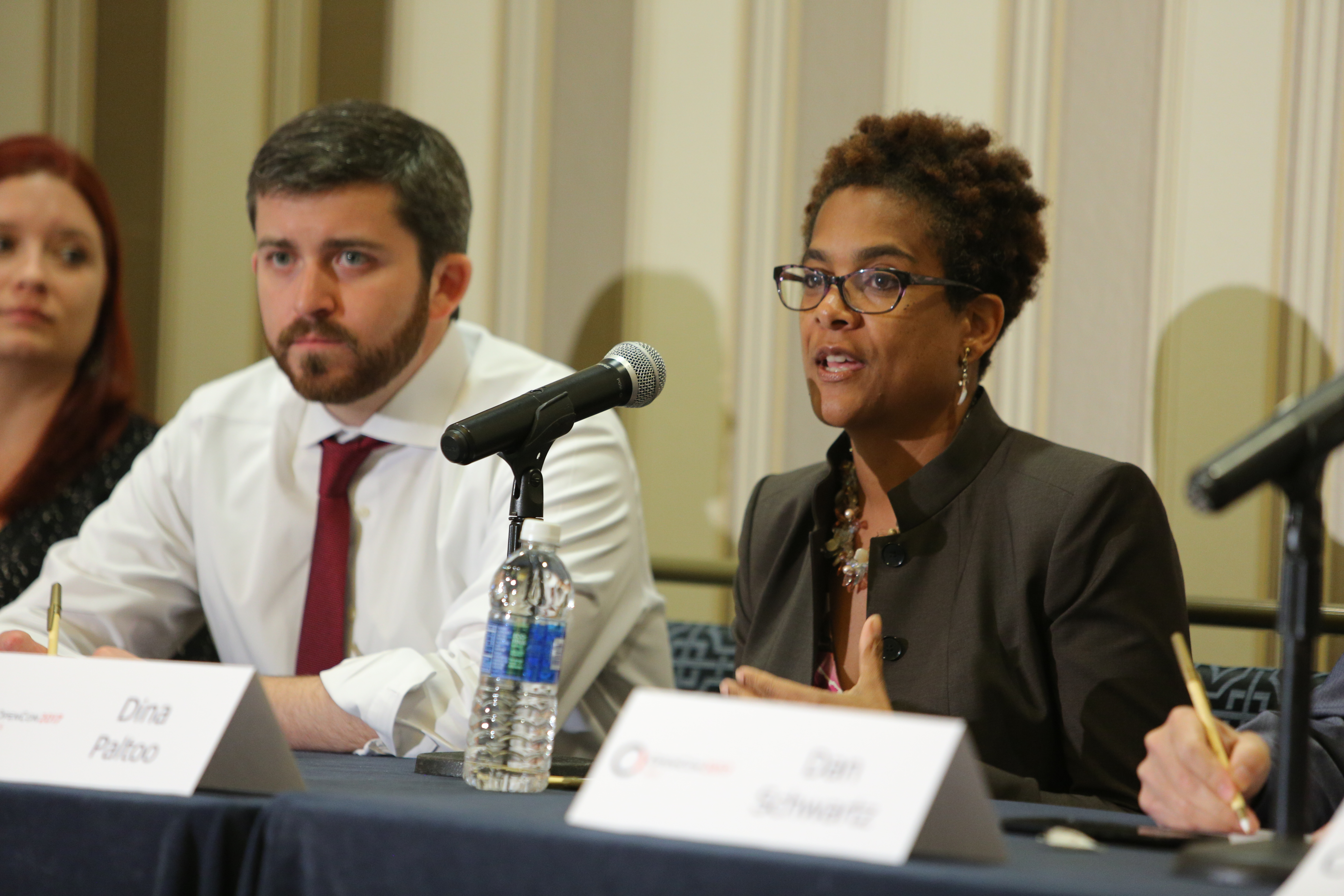
Dina Paltoo (right) of the National Institutes of Health answered questions during the OpenCon panel discussion alongside SPARC’s Nick Shockey (left).
ECS hosted its first ever satellite OpenCon event during the 232nd ECS Meeting. OpenCon is an international event hosted by the Right to Research Coalition, a student organization of the Scholarly Publishing and Academic Resources Coalition (SPARC).
“This ECS OpenCon is a really important first for the global OpenCon community. It’s the first OpenCon satellite event hosted by a scholarly society, and that’s a huge deal,” said Nick Shockey, SPARC director of programs and engagement and OpenCon speaker. “The research that ECS members do has a very real-world impact, and making that work openly available will hopefully accelerate the research and innovation.”
Other speakers included Ashely Farley, Bill and Melinda Gates Foundation; Brian Nosek, Center for Open Science; Meredith Morovati, Dryad; Diana Paltoo, National Institutes of Health; and Dan Schwartz, University of Washington’s Clean Energy Institute.
ECS Data Sciences Hack Day
Another landmark event at National Harbor was the ECS Data Sciences Hack Day, the Society’s first foray into building an electrochemical data sciences and open source community from the ground up.
“Hack Day is an opportunity to get people together to build software, learn how to program, and eventually build a community of data science at ECS,” said Matt Murbach, University of Washington graduate student and co-organizer of the event. “We’re trying to build a repository for software that people use in their daily lives as electrochemists, except we want it to be open. We want people to contribute to packages that other researchers can use and have the ability to build tools and analysis techniques that are reproducible.”
Daniel Schwartz, Boeing-Sutter Professor of Chemical Engineering and director of the Clean Energy Institute at the University of Washington; and David Beck, Sr. Data Scientist with the eSciences Institute at the University of Washington also co-organized this event.
Electrochemical Energy Summit
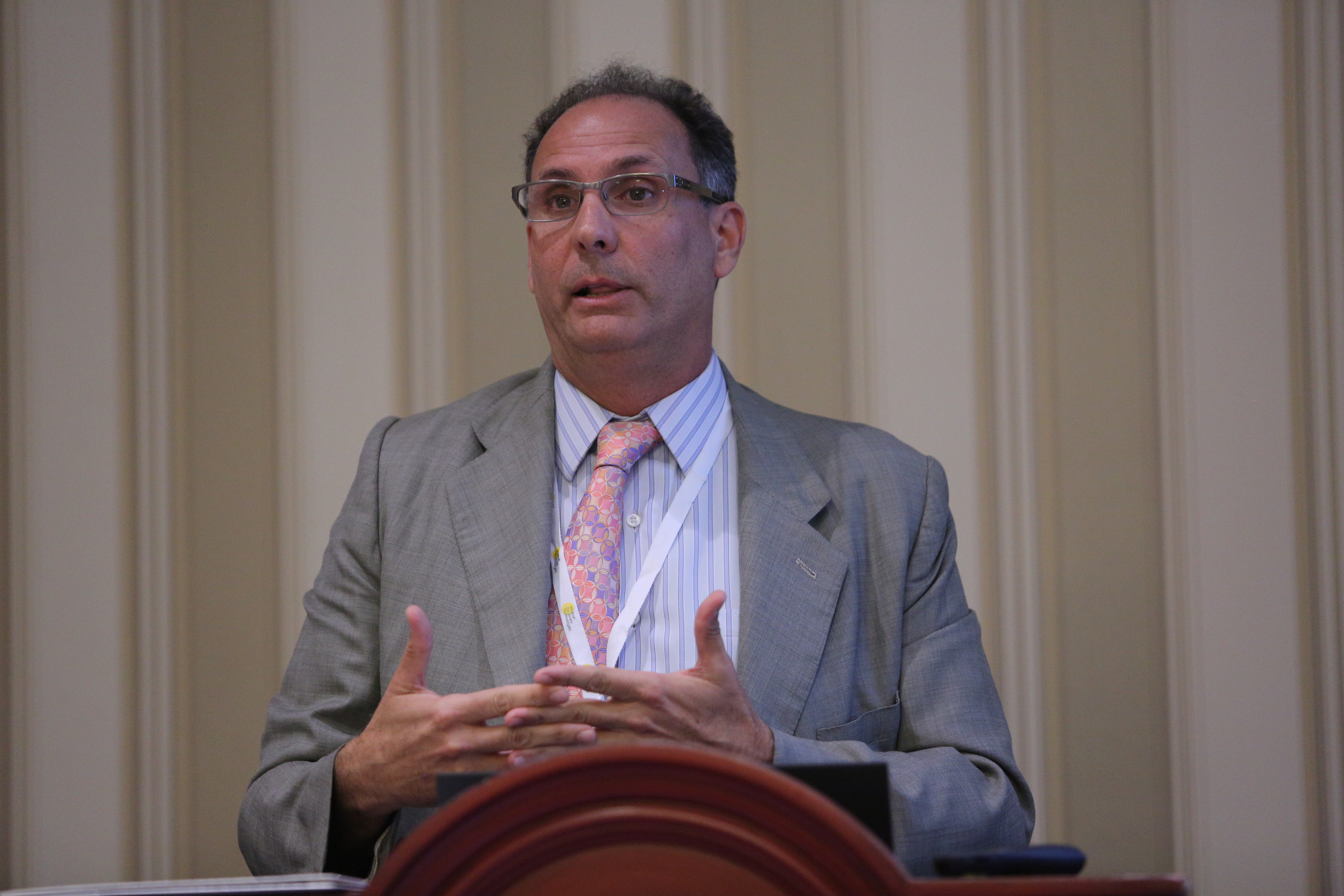
The Energy-Water Nexus featured a talk by Fernando Miralles-Wilhelm of the Earth Systems Science Interdisciplinary Center.
The 7th International ECS Electrochemical Energy Summit took place during the 232nd ECS Meeting. This year’s summit theme was “Human Sustainability – Energy, Water, Food, and Health,” and included three distinct symposia: Energy-Water Nexus; The Brain and Electrochemistry; and Sensors for Food Safety, Quality, and Security.
The summit was chaired by Eric Wachsman, University of Maryland and organized by Bryan Chin, Auburn University; Lili Deligianni, IBM Corporation Research Center; and Christian Bock, National Research Council of Canada.
“The Electrochemical Energy Summit is really focused on using electrochemistry to address human sustainability issues,” Wachsman said. “We’re bringing in agencies that support the research that is critical for the members of ECS. This is a unique benefit for the members of the Society to find out about opportunities to fund their research so they can make the developments to address the needs of the human population.”
In total, the summit had 116 technical presentations across the three symposia, and brought invited speakers from organizations ranging from the National Science Foundation to the U.S. Food and Drug Administration.
Ride-and-Learn
ECS meeting attendees had the opportunity to see some of the world’s first commercial hydrogen and fuel cells vehicles, as well as hear updates from the U.S. Department of Energy, at the DOE Ride-and-Learn event.
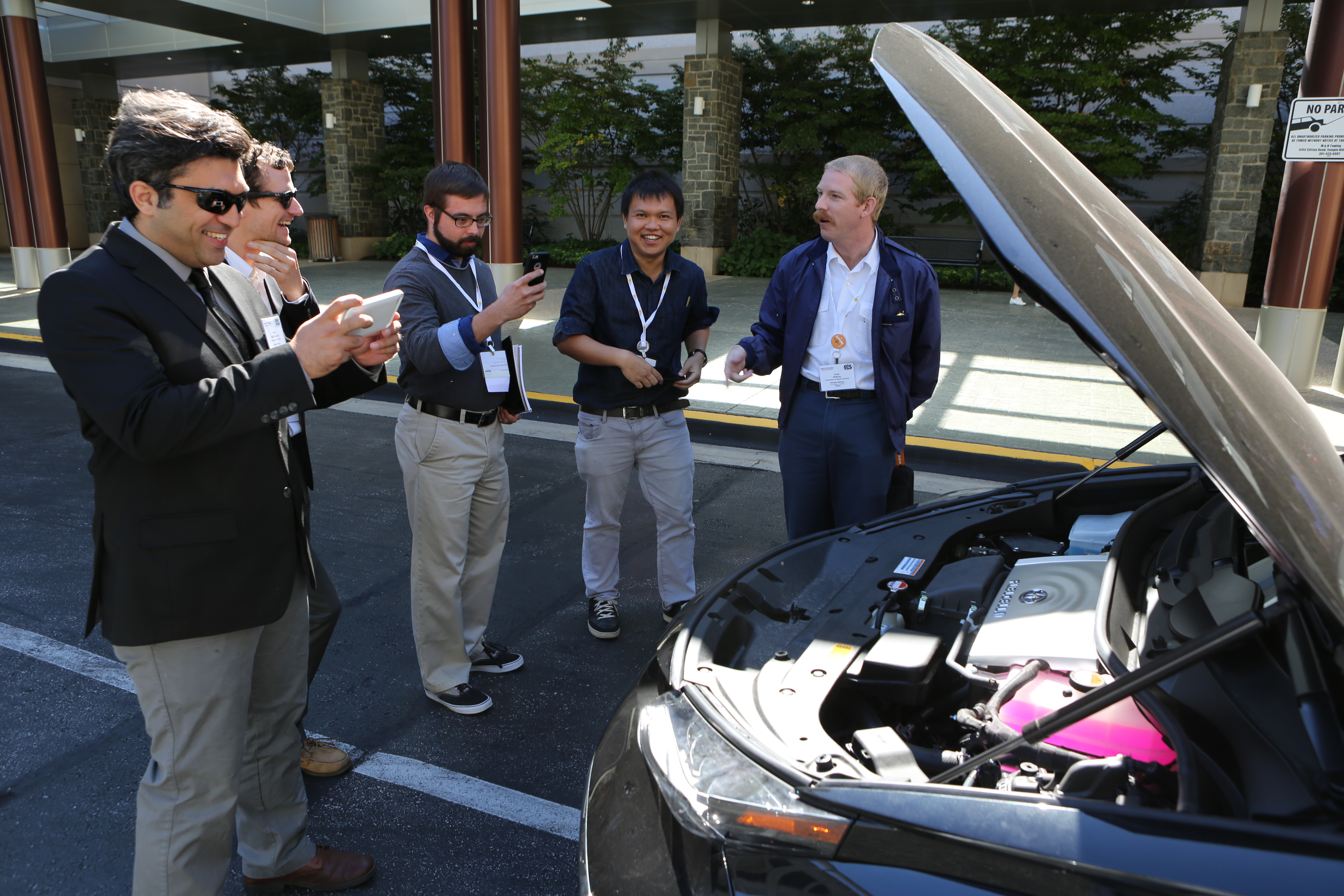
Meeting attendees learn about the technology behind fuel cell vehicles during the DOE Ride-and-Learn event.
“There are now three hydrogen fuel cell cars that are commercially available,” said Sunita Satyapal, director of fuel cell technologies at the DOE. “We’re continuing to make progress on both fuel cells and hydrogen production, and it’s pretty historic that we’ve come this far in a relatively short period of time.”
The Ride-and-Learn was organized by the DOE’s Fuel Cell Technologies Office (FCTO) in the Office of Energy Efficiency and Renewable Energy. FCTO has funded early-stage hydrogen and fuel cells research and development enabling a 60 percent reduction in fuel cell cost, a fourfold increase in fuel cell durability and an 80 percent cut in the cost of electrolyzers over the past decade.
Award Highlights
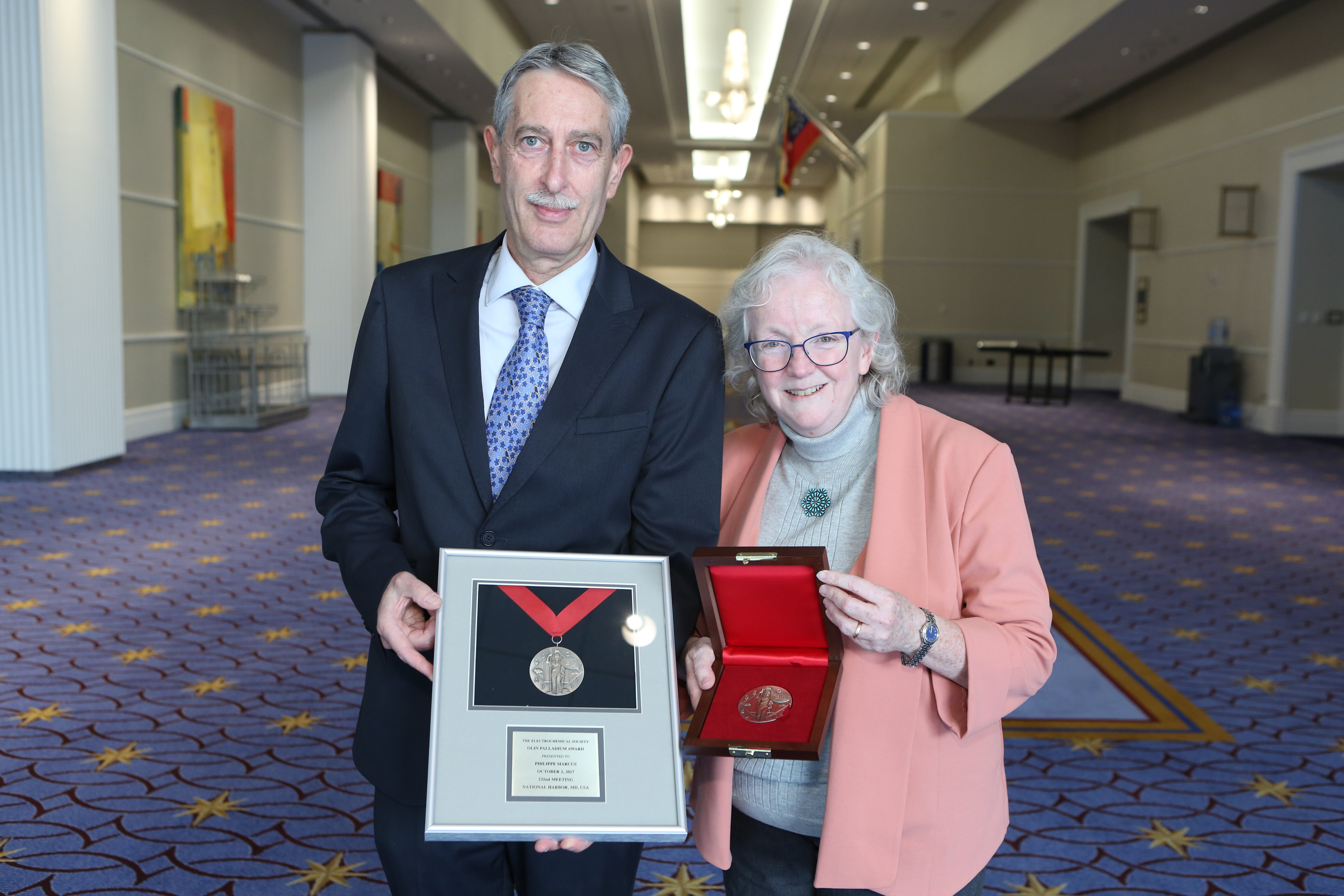
ECS President Johna Leddy (right) with Philippe Marcus (left) from CNRS, winner of the Olin Palladium Award.
The 2017 Olin Palladium Award was presented to Philippe Marcus. Marcus is the director of research at CNRS (National Centre for Scientific Research) and head of the research group of physical chemistry of surfaces at the Institut de Recherche de Chimie Paris, at Chimie ParisTech, France. His field of research is surface electrochemistry and corrosion science, with emphasis on understanding the relationship between structure and properties of metal surfaces and oxide films at the atomic or nanometric scale.
The Olin Palladium Award was established in 1950 for distinguished contributions to the field of electrochemical or corrosion science. The award was founded with the funds from the royalties derived from the sale of Herbert H. Uhlig’s Corrosion Handbook. The handbook was sponsored and largely written by members active in the ECS Corrosion Division.
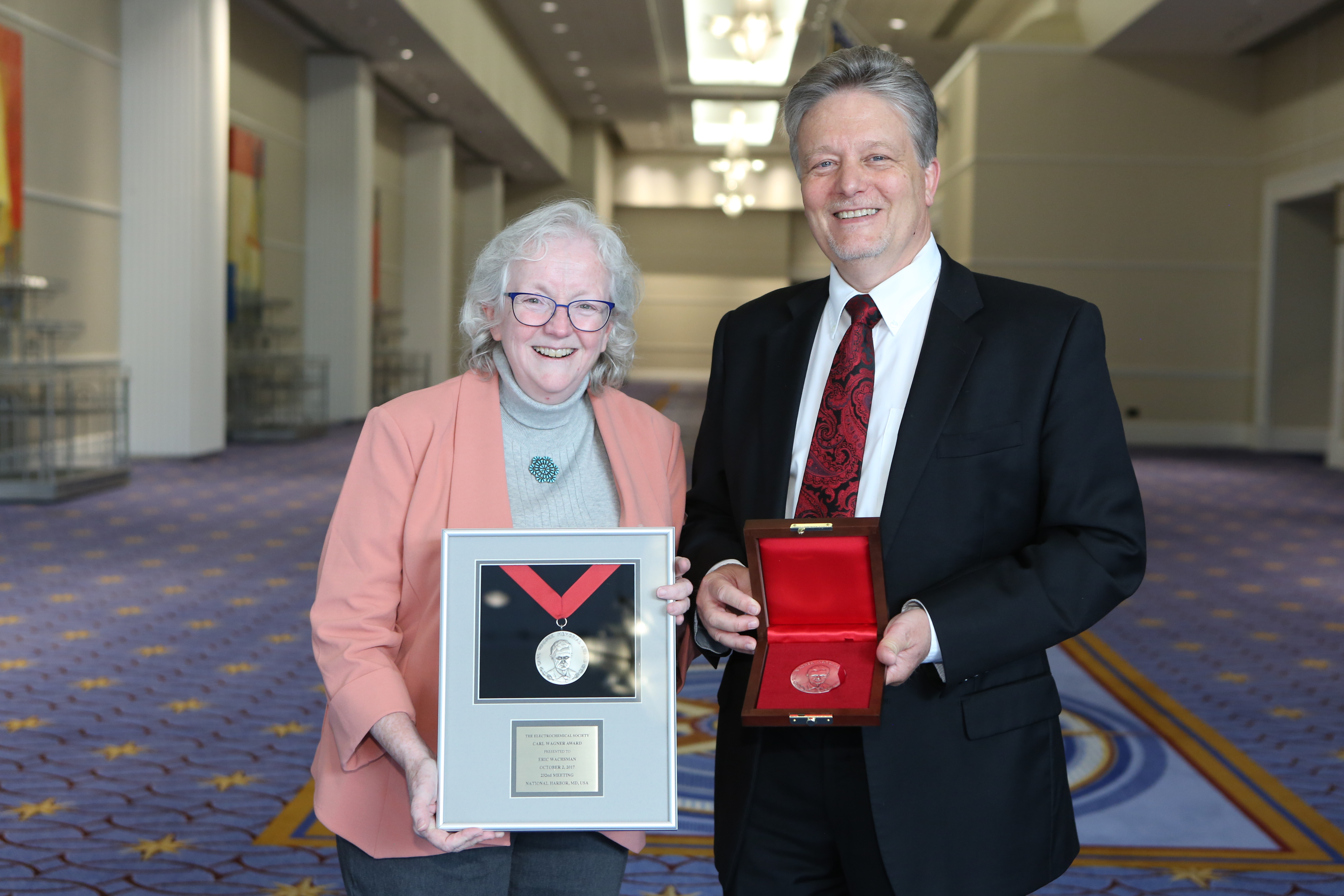
ECS President Johna Leddy (left) with Eric Wachsman (right) from the University of Maryland, winner of the Carl Wagner Memoria Award.
The 2017 Carl Wagner Memorial Award was presented to Eric Wachsman. Wachsman is the director of the Maryland Energy Innovation Institute and Crentz Centennial Chair in Energy Research, with appointments in both the Department of Materials Science and Engineering and the Department of Chemical Engineering at the University of Maryland. Wachsman is a fellow of both ECS and the American Ceramic Society and serves on the ECS Board of Directors.
The Carl Wagner Memorial Award was established in 1980 to recognize mid-career achievement, excellence in research areas of interest of the Society, and significant contributions in the teaching or guidance of students or colleagues in education, industry, or government. The award commemorates Carl Wagner, a man of outstanding scientific achievement with important contributions in all areas of the Society’s interest, the Society’s first Palladium Award winner, and a dedicated teacher.
The Norman Hackerman Young Author Award for the best paper published by young authors in the Journal of The Electrochemical Society for a topic in the field of electrochemical science and technology went to Mark Burgess and Kenneth Hernández-Burgos from University of Illinois at Urbana-Champaign for their paper, “Scanning Electrochemical Microscopy and Hydrodynamic Voltammetry Investigation of Charge Transfer Mechanisms on Redox Active Polymers.”
The Bruce Deal & Andy Grove Young Author Award for the best paper published by a young author in the ECS Journal of Solid State Science and Technology for a topic in the field of solid state science went to Peng Sun from the University of Michigan for his paper, “Toward Practical Non-Contact Optical Strain Sensing Using Single-Walled Carbon Nanotubes.”
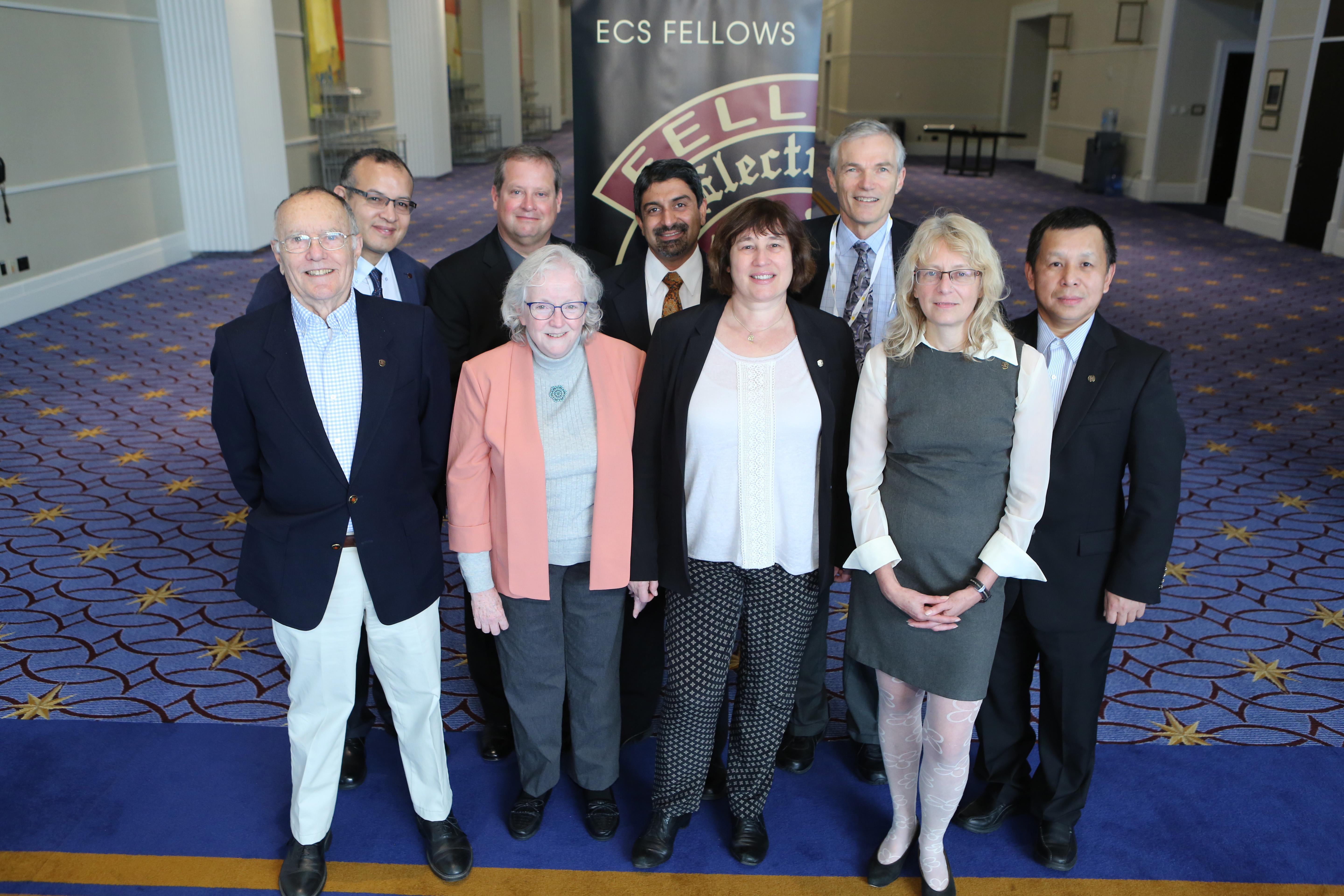
ECS 2017 Class of Fellows Front row, from left to right: Robert Huggins, ECS President Johna Leddy, Marca Doeff, Christina Bock; Back row, from left to right: Khalil Amine, Chris Johnson, Rangachary Mukundan, Scott Barnett, and Nianqiang (Nick) Wu. Not pictured are Christian Amatore, Plamen Atanassov, Mario Ferreira, Clare Grey, Joachim Maier, Tae-Yeon Seong, and Yang Shao-Horn.
Yue Kuo, ECS senior vice president, assisted with the introduction of the 2017 Class of Fellows. These members are recognized for contributions to the advancement of science and technology, for leadership in electrochemical and solid state science and technology, and for active participation in the affairs of ECS.
Christian Amatore: For outstanding contributions in physical, analytical and molecular electrochemistry through pioneering ultramicro/nanoelectrodes and bringing new important concepts to these fields that led to major outcomes in chemistry, catalysis, and neuroscience.
Khalil Amine: Outstanding achievement in the field of material sciences, electrochemistry, and more specifically, energy storage.
Plamen Atanassov: For important discoveries, innovation, and leadership in the areas of bio-electrochemistry and materials for electrochemical energy conversion.
Scott Barnett: For his extensive and outstanding contributions to solid oxide fuel cells and batteries and his valuable service to the Society.
Christian Bock: For technical research contributions in the area of synthesis and characterization of electrochemical catalysts for energy conversion and storage, environmental control, and electrolyzer applications for over 25 years.
Marca Doeff: For pioneering work on sodium-ion batteries, especially identification and characterization of novel electrode materials, for characterization of solid electrolyte and Li-ion battery cathode materials using synchrotron techniques, and for continued service to the Society.
Mario Ferreira: For contributions to corrosion science and electrochemistry in the service, technology and education industries.
Clare Grey: For the distinguished contributions to the fundamental understanding of the behavior of electrode materials for lithium ion batteries.
Robert Huggins: For lifetime contributions to the fundamental understanding of battery materials and solid state ionics.
Christopher Johnson: For exceptional contributions to advance the field of electrochemical energy storage and for tireless service to ECS.
Joachim Maier: For outstanding contributions to the theory and study of point defects and space charges in ionic solids at surfaces and interfaces, resulting in groundbreaking work in the field of size effects in ionic conductors.
Rangachary Mukundan: For unmatched, exemplary service and contributions to the Society, the ECS Sensor Division, and the mentoring of students for over 20 years.
Tae-Yeon Seong: In recognition of significant contributions to the fields of compound semiconductor materials characterization, processing, and optoelectronic devices.
Nianqiang Wu: For advancing the science and engineering of sensors for improvement of health and environmental sustainability and for pioneering contributions to the theory of plasmonic solar energy conversion, materials, and devices to secure new sources of energy.
The ECS Chapters of Excellence Awards went to the University of Washington and the ECS Munich Student Chapter, made up of students from the Technical University of Munich and Munich University of Applied Sciences.
The Outstanding Student Chapter Award went to the University of Maryland.
There were 12 division and section awards:
- Battery Division Technology Award was presented to Yang-Kook Sun of Hanyang University.
- Battery Division Technology Award was presented to Jun Liu of Pacific Northwest National Laboratory.
- Battery Division Research Award was presented to Ryoji Kanno of Tokyo Institute of Technology.
- Battery Division Postdoctoral Associate Research Award Sponsored by MTI Corporation and the Jiang Family Foundation was presented to Haegyeom Kim of Lawrence Berkeley National Laboratory.
- Battery Division Postdoctoral Associate Research Award Sponsored by MTI Corporation and the Jiang Family Foundation was presented to Kimberly See of University of Illinois at Urbana-Champaign.
- Battery Division Student Research Award was presented to Lin Ma of Dalhousie University.
- Corrosion Division H. H. Uhlig Award was presented to Herman Terryn of Vrije Universiteit Brussel.
- Corrosion Division Morris Cohen Graduate Student Award was presented to Mohsen Esmaily of Chalmers University of Technology.
- Electrodeposition Division Research Award was presented to Stanko Brankovic of University of Huston.
- Electrodeposition Division Early Career Investigator Award was presented to Jiahua Zhu of University of Akron.
- High Temperature Materials Division J. Bruce Wagner, Jr. Award was presented to Cortney Kreller of Los Alamos National Laboratory.
- Europe Section Heinz Gerischer Award was presented to Kazuhito Hashimoto of Univeristy of Tokyo.
There were 95 submissions to the Student Poster Session. The winners were:
1st Place – Wet
Saad Intikhab, Drexel University
Poster title: “Understanding the pH Dependence of the Reversible Hydrogen Reaction through Modified Low Index Pt Single Crystals”
2nd Place – Wet
Sungyup Jung, The City College of New York
Poster title: “Effects of Reaction Conditions on Electroreduction of Biomass-Derived Furfural and Its Side Reactions in Acidic Electrolyte”
3rd Place – Wet
Travis Omasta, University of Connecticut
Poster title: “Methanol Production – a Key Intermediate in the Electrochemical Interconversion of Organics to Chemicals and Fuels”
1st Place – Solid
Yubin Liu, Kanagawa University
Poster title: “Synthesis of Water-Resistant thin TiOx Layer-Coated High-Capacity LiNiaCobAl1-a-BO2 (a > 0.85) Cathode and Its Stable Charge/Discharge Cycle Cathode Performance to Apply a Water-Based Hybrid Polymer Binder to Li-Ion Batteries”
2nd Place – Solid
Abubakar Khaleed, University of Pretoria, South Africa
Poster title: “Solvothermal Preparation of Microspherical Flowerlike Ni(OH)2/Graphene Oxide Electrode for Electrochemical Capacitor Application”
Honorable Mentions:
Hiroki Shiikuma, Tokyo University of Science
Poster title: “Dependence of Crystal Structure and Electronic Structures, Dielectric and Piezoelectric Properties on Composition for (K, Na)NbO3-(Bi, Na)TiO3”
Oliver Harris, Drexel University
Poster title: “Understanding Capacity Fade Mechanisms in High-Voltage Lithium-Ion Batteries”
Mariko Kadowaki, Tohoku University
Poster title: “Real-Time Microelectrochemical Observation of Very Early Stage of Pitting on Carbon Steel in Chloride Solution”
Exhibitors
Special thanks go to all the meeting sponsors and exhibitors who showcased the tools and equipment so critical to scientific research.





